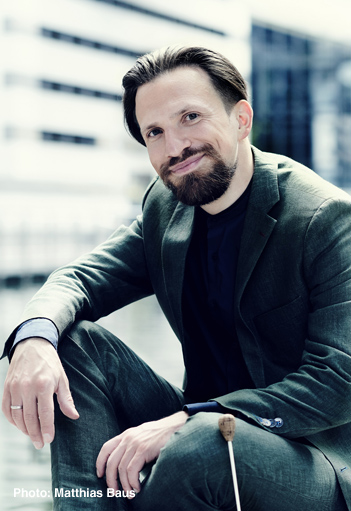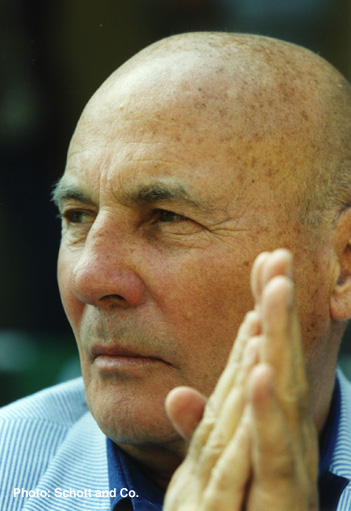
|
Oops! Something went wrong!
The application has encountered an unhandled error.
Our technical staff have been automatically notified and will be looking into this with the utmost urgency.
|
Established in 1589 as the Court Orchestra of Württemberg, the Württemberg Stuttgart State Orchestra has a history of over four hundred years. Over the generations there have been collaborations with musicians of distinction, among them Leonhard Lechner, the Frobergers, Niccolò Jommelli, Johann Rudolf Zumsteeg, Konradin Kreutzer, Johann Nepomuk Hummel and Carl Maria von Weber.
Berlioz praised the orchestra when he appeared with it as conductor, and in the 1880s Stuttgart was one of the first to stage the complete Ring cycle conducted by the then general music director Herman Zumpe, who had assisted Wagner at the first Bayreuth Festival. The tradition of first performances has included Strauss’s Ariadne auf Naxos in 1912 conducted by the composer, in 1921 a one-acter by Hindemith, and in recent times works by Orff, Penderecki, Glass, Zender, Riehm and Hölszky.
In the twentieth century there was collaboration with Fritz Busch, Carl Leonhardt, Franz Konwitschny, Hans Swarowsky and Herbert Albert, and in particular with Max von Schillings and Ferdinand Leitner, and in more recent years with conductors such as Carlos Kleiber, Vaclav Neumann, Silvio Varviso, Janos Kulka, Dennis Russell Davies, Garcia Navarro and Gabriele Ferro as music directors and conductor, and as guests, Georg Solti, Carlo Maria Giulini and Riccardo Chailly. Lothar Zagrosek took over the helm of the orchestra in 1997 and has been responsible for a number of important and innovative performances.
In 2002 the orchestra was named Orchestra of the Year by Opernwelt. The work of the orchestra has included recordings and DVDs in addition to symphony concerts and chamber music performed by members of the orchestra.

Cornelius Meister, born in Hanover in 1980, became principal conductor and artistic director of the ORF Radio Symphony Orchestra Vienna in September 2010.
With the RSO Vienna he has held regular concerts in the Vienna Musikverein and the Vienna Konzerthaus. Extensive tours have taken him to Japan and throughout Europe, including to Salzburg Festival. Together with the RSO Vienna, he has been present on European radio, European television, on albums and in the internet.
From 2005 to 2012, Cornelius Meister was general director of music in Heidelberg. During this time he was awarded the ‘Prize for the Best Concert Programme’ by the German Federation of Music Publishers and the ‘Young Ears’ Prize and the Prize of the German Music Council for conveying music to children and adolescents in 2007 and 2010.
In concerts, Cornelius Meister also conducts Het Concertgebouworkest Amsterdam, the City of Birmingham Symphony Orchestra, the BBC Philharmonic Orchestra Manchester, the Washington Symphony, the Indianapolis Symphony, the Baltimore Symphony, the Orchestra dell’Accademia di Santa Cecilia Rome, Sveriges Radios Symfoniorkester Stockholm, the Danish National Symphony Orchestra, the Orchestre de l’Opéra national de Paris, the Ensemble intercontemporain Paris, the Deutsches Symphonie Orchester Berlin in the Berlin Philharmonic Hall, the Radio Symphony Orchestra Berlin, the NDR Symphony Orchestra Hamburg and the Symphony Orchestra of Bavarian Radio.
At the age of 21, Cornelius Meister held his début at Hamburg State Opera, followed by débuts at the Bavarian State Opera in Munich, the New National Opera Tokyo, the San Francisco Opera, the German Opera in Berlin, the Theater an der Wien, the Latvian National Opera in Riga (Der Ring des Nibelungen), the Royal Opera in Copenhagen, the Semper Opera in Dresden, Zurich Opera and Vienna State Opera.
Cornelius Meister studied piano and conducting with Konrad Meister, Martin Brauss and Eiji Oue in Hanover and with Dennis Russel Davies, Jorge Rotter and Karl Kamper at Salzburg Mozarteum. He also plays the cello and the French horn. As a pianist, he has held concerts in Europe and the USA and is a prizewinner of the German Music Competition and the Schleswig-Holstein Music Festival.

Hans Werner Henze is among the most prolific and successful of contemporary German composers. His systematic study of music only began after the war, with Wolfgang Fortner, and later with visits to Darmstadt and absorption of serial technique, to be used with great originality in a musical language that was also influenced by Stravinsky. In 1953 he moved to Italy and gradually developed his leaning towards the political New Left, reflected in some of his music and choices of texts and themes. His activities at Montepulciano and his involvement with the Munich Biennale, among other things, have enabled him to exercise a strong influence on the course and promotion of contemporary music.
Stage Works
Henze’s immensely successful operas range from the 1951 Kafka radio opera, with its Trakl settings, Ein Landarzt (‘A Country Doctor’) to König Hirsch (‘King Stag’), Der Prinz von Homburg (after Kleist), Elegy for Young Lovers (with a libretto by W.H. Auden and Chester Kallmann), Der junge Lord (‘The Young Lord’), The Bassarids (with Auden and Kallmann, based on Euripides), and We Come to the River and The English Cat, with texts by Edward Bond. Der verratene Meer (‘Treacherous Oceans’), based on Yukio Mishima’s Gogo no eiko, translated as The Sailor who fell out of Grace with the Sea, had its premiere in 1990, to be followed by Venus and Adonis, L’Upupa und der Triumph der Sohnesliebe (‘The Hoopoe and The Triumph of Filial Love’ – an Arabian fairytale), and, in 2007, Phaedra, a reworking of the tragedy of Phaedra and her stepson Hippolytus. Henze has also provided music for a series of ballets, with incidental music for the cinema and the theatre.
Orchestral Music
An exceptionally wide range of orchestral music includes 10 symphonies, with a seventh drawing on Hölderlin and an eighth on Shakespeare’s A Midsummer Night’s Dream. Henze has written concertos for piano, for violin and, for Gary Karr, a Double Bass Concerto, as well as a Double Concerto for oboe and harp for Heinz and Ursula Holliger.
Chamber and Instrumental Music
In addition to his string quartets Henze has written music for a variety of ensembles, including sonatas for violin, for viola and for flute (all with piano). Music for solo instruments includes the useful Lucy Escott Variations for harpsichord, works for violin, double bass, cello, marimba and trumpet, as well as a set of pieces for solo guitar. These last include his two Royal Winter Music sonatas, with movements based on characters from Shakespeare.
Vocal and Choral Music
Vocal and choral music by Henze is equally varied and remarkable. It includes Novae de infinito laudes (‘New Praises of the Infinite’), with a text from Giordano Bruno; the Muses of Sicily, after Virgil; the controversial Das Floss der ‘Medusa’ (‘The Raft of the Medusa’); and the revolutionary El Cimarrón (‘The Fugitive’).






























